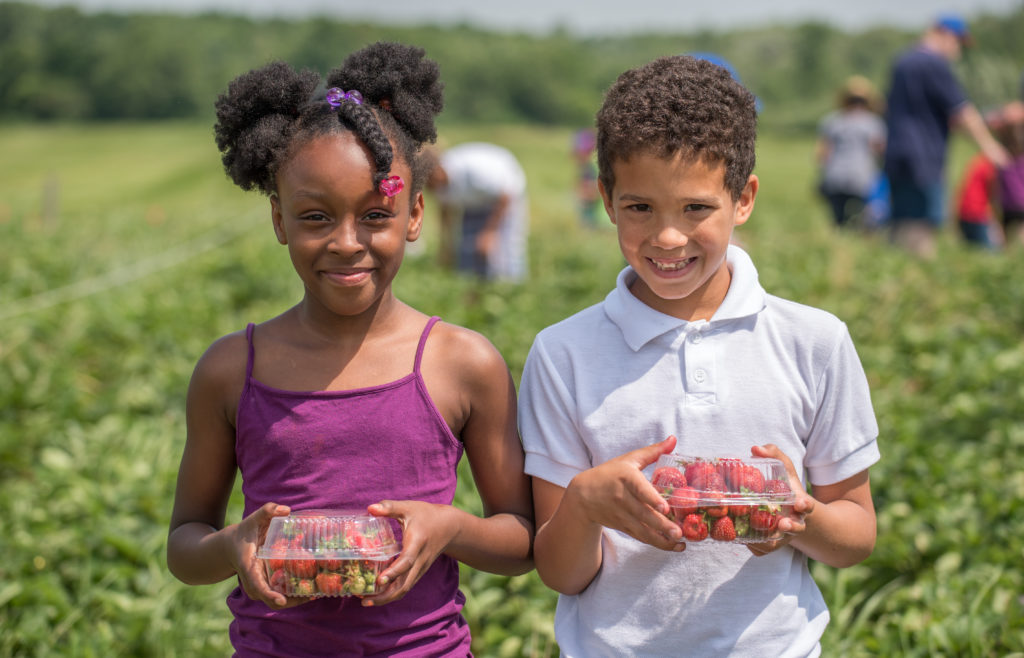Food for Thought: Farm-to-School Feeds Students, Communities
Cornell Cooperative Extension is part of a statewide network working to bring fresh, locally-sourced food to students while supporting local farmers and food producers.
In counties across New York, farm-to-school (F2S) programs are connecting K-12 students with much-needed healthy food. Through F2S, students have reliable access to fresh, locally-sourced fruits and vegetables and other farm products while district dollars go back into the pockets of local farmers and food producers.
Collaborating with a wide array of stakeholders and programming partners, Cornell Cooperative Extension county associations and regional agriculture teams are on the front lines of these efforts. Our system has association offices located in every county, housing extension specialists and educators trained to provide research-based nutrition, family development, agriculture and economic development expertise and outreach to their communities.
The mission of F2S is a familiar one for CCE. It is firmly in our wheelhouse and has been stitched into our service fabric for many years.
For CCE educators, today’s F2S efforts mean connecting school food services directors with farmers to procure local fruits, vegetables, dairy products and animal- and plant-based proteins along with training food service staff on food prep techniques. We also teach students and parents about the value of healthy eating and lead farm visits to show them where their food comes from.
CCE educators also directly interface with districts as well as state and local agencies to secure and maximize important federal and state funding – in particular, recent grants from New York State Agriculture & Markets (NYSDAM). State funding in support of F2S programming — which doubled in the governor’s 2018-19 budget — have given our efforts new wings. A component of the “No Student Goes Hungry” initiative, there is a key $.25-per-lunch-served incentive for schools that purchase at least 30 percent of their meal ingredients from New York farms or utilize products comprised of at least 51 percent New York-grown ingredients.

As part of the Farm-to-School Program administered by CCE’s Harvest NY team, Buffalo City School District students visit farms where they interact with farmers, animals and produce to learn about the local food system and where the dairy products they consume come from.
R.J. Anderson / Cornell Cooperative Extension
Currently there are 16 counties across the state involved in CCE-assisted F2S programs that utilize direct funding from NYSDAM. We also recently launched the “Farm to School New York” Program Work Team consisting of CCE educators, Cornell University faculty and external stakeholders who collaborate on F2S efforts across the state.
While CCE also is involved in F2S projects utilizing a variety of other funding streams, here are a few highlights of CCE’s work in NYSDAM-funded counties across the state:
- In western New York, CCE’s Harvest New York agricultural economic team is now in its sixth year collaborating on F2S measures with the Buffalo City School District (BCSD). An 11-school pilot program that began in 2015 has grown to now provide local foods and nutritional education programming in 86 buildings, where they serve 30,000 lunches and 24,000 breakfasts daily.
In addition to addressing food insecurity in Buffalo’s inner city by providing access to healthy food, western New York’s agricultural economy also gets a boost – one that continues to trend upward. Of the District’s $13M total food budget for 2019-20, it’s forecasted that $3.1M will be used to purchase local produce and dairy products.
- While also supporting the BCSD project, CCE Erie County’s efforts extend across the county through a dedicated F2S Coordinator working to establish connections between 14 farms and 13 school districts. Collectively the program serves more than 25,000 students with a goal of helping the districts meet the 30 percent New York-grown-ingredient incentive mark.
- In the Finger Lakes region, CCE Seneca educators are leading F2S efforts in 13 schools across four districts. This year, nearly 4,000 children in grades K-12 have access to a variety of locally grown products.
- Up north, CCE St. Lawrence County is partnering with St. Lawrence-Lewis BOCES to bring fresh fruits and vegetables – grown by 25 North Country farmers – to 18,600 students in 21 school cafeterias in St. Lawrence and Lewis Counties. A “Know Your Farmer” campaign also is underway to create a stronger connection between students and growers.
- In the Mohawk Valley, CCE Oneida County is benefitting 56,000 students in 37 school districts by working to procure local food and provide training to cafeteria staff.
- In the Southern Tier, CCE Steuben County, in partnership with Greater Southern Tier BOCES and our CCE Schuyler and CCE Chemung County associations, is working to increase procurement of local specialty crops. In addition to local farmers, the effort benefits 28,907 students in 21 school districts across three counties.
- Also in the Southern Tier, CCE Broome County educators are assisting Broome-Tioga BOCES in the procurement of local farm products in a project that also better equips cafeterias to prepare local farm products and educates students about the local foods included in their menus. The project will benefit 21,455 students in 10 school districts.
It’s important to note, and as you can see, CCE has not been alone in these F2S initiatives. We are extremely thankful to be part of many dynamic collaborations that tap into the strengths of our community partners. From state, county and municipal leaders to the school districts and food producers, we are proud to work in concert with our F2S partners to elevate this important work on behalf of New York’s schools, children and farmers.

